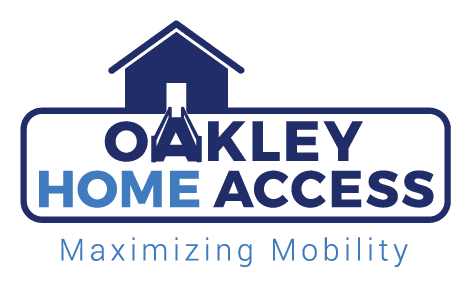Lifting Techniques for Home Caregivers
Caring for a loved one at home in Rhode Island, Massachusetts, or Connecticut often involves assisting with daily movements, transferring from bed to chair, helping into the shower, or aiding in standing up. Without proper lifting techniques, these tasks can lead to injuries for both the caregiver and the individual receiving care. Understanding safe lifting practices and knowing when to utilize accessibility equipment are crucial for ensuring safety and promoting independence.
Key Takeaways
- Proper lifting techniques reduce injuries for both caregivers and loved ones.
- Use equipment like patient lifts and grab bars when mobility is limited.
- Oakley Home Access provides expert solutions across RI, MA, and CT.
- Local funding programs can help cover accessibility modification costs.
Understanding the Risks of Improper Lifting
Many caregivers underestimate the physical demands of lifting and transferring individuals. Improper techniques can result in:
- Back injuries: Strains, herniated discs, and chronic pain are common among caregivers who lift without proper form.
- Falls: Both the caregiver and the individual can suffer serious injuries from slips or falls during transfers.
- Emotional strain: The stress of potential injuries can lead to caregiver burnout.
According to the Massachusetts Nurses Association, manual patient handling is a significant risk factor for overexertion injuries among caregivers.
Core Principles of Safe Lifting Techniques
Implementing proper body mechanics is essential:
- Plan ahead: Ensure the path is clear and the destination is ready.
- Communicate: Explain the process to the individual to coordinate movements.
- Position yourself correctly:
- Stand close to the person.
- Keep your back straight and bend at the knees.
- Use your legs to lift, not your back.
- Avoid twisting your torso; pivot with your feet instead.
These techniques help distribute weight evenly and reduce the risk of injury.
When to Incorporate Accessibility Equipment
While proper lifting techniques are vital, certain situations necessitate the use of assistive devices:
- Limited mobility: If the individual cannot assist in the transfer.
- Frequent transfers: Regular movements increase the risk of strain.
- Caregiver limitations: Physical constraints or health issues of the caregiver.
In such cases, equipment like patient lift systems, stairlifts, and grab bars can provide safer alternatives.
Accessibility Solutions in Rhode Island, Massachusetts, and Connecticut
A trusted provider like Oakley Home Access specializes in providing tailored solutions to enhance home safety and accessibility:
- Patient Lift Systems: Ideal for transferring individuals between beds, chairs, and bathrooms with minimal physical effort.
- Stairlifts and Vertical Platform Lifts: Facilitate safe movement between different floor levels.
- Grab Bars and Bathroom Modifications: Enhance stability in high-risk areas like bathrooms.
This team offers free home safety assessments to determine the most suitable equipment for your needs.
Real-Life Application: A Local Success Story
In Providence, Rhode Island, Oakley Home Access assisted a family caring for an elderly parent with mobility challenges. By installing a ceiling-mounted patient lift system and strategically placed grab bars, the family could safely transfer their loved one without physical strain, significantly improving their quality of life.
Funding Assistance for Accessibility Equipment
We understand that cost can be a concern. Various funding options are available in our service areas.
- Rhode Island Livable Home Modification Grant: Covers up to 50% of home modification costs.
- Connecticut’s Money Follows the Person Program: Provides financial assistance for accessibility equipment.
- Massachusetts Rehabilitation Commission: Offers funding for assistive technology and home modifications.
Oakley Home Access team can guide you through the application processes to access these resources.
Contact Oakley Home Access Now!
Safe and effective lifting techniques are not just helpful—they’re essential for injury prevention and peace of mind. Whether you’re caring for an aging parent in Warwick, RI, assisting a spouse in Worcester, MA, or supporting recovery in New Haven, CT, Oakley Home Access can help you make smart, safe home modifications that support your needs.
Schedule your FREE home safety assessment today and let our local accessibility experts guide you toward the right lifting solutions for your family.
Frequently Asked Questions (FAQs)
What are safe lifting techniques for caregivers in Rhode Island homes?
Caregivers in Rhode Island should follow safe lifting techniques like bending at the knees, keeping the person close, avoiding twisting, and using assistive devices like grab bars or patient lifts when needed. Local experts like Oakley Home Access provide guidance and home modifications to reduce injury risk.
When should we install a patient lift system in Massachusetts homes?
If your loved one requires frequent help with transfers or cannot assist in movements, it’s time to consider a patient lift system.
Are there local funding options for home safety equipment in Connecticut?
Yes, Connecticut offers programs like Money Follows the Person to help cover costs of home accessibility modifications.
Do I need professional installation for stairlifts in New England homes?
Absolutely. Professional installation ensures safety, proper alignment, and compliance with local building codes. Oakley Home Access provides certified stairlift installations throughout Rhode Island, Massachusetts, and Connecticut.
